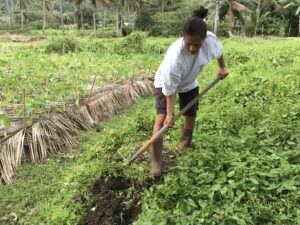
Julie Uka planting in her organic garden in the Cook Islands
“Ladies and gentlemen, this is a woman, not a man,” Julie Uka stated dramatically to the camera as we videoed mulched taro beds, a resilient farming practice in Cook Islands.
All around the 43-year-old were the taro beds she had planted, mostly alone, sometimes with her children. Julie lives by the mantra, “If men can do it, women can too.”
“To feed the taro patch, we put the grass and weeds back into the soil. This way we don’t have to use fertiliser,” she said demonstrating the steps involved in preparing a taro bed using the organic technique of mulching. Nothing is wasted, everything goes back into the soil.”
She used kikau to cover the wet cardboard already laid out over every inch of the ground. The kikau acts as a weed suppressor, eliminating the task of weeding or paying labourers to keep the farm clean. The mulch creates a moist environment for the taro to grow even when the rains do not come, and the land is dry and the sun is blazing. The taro is ready within six months.
Every week, taro sales give Julie and her children enough money to pay the family bills and buy staples. Every day she works on the farm. Despite criticism about “doing a man’s job” and challenging cultural expectations about a woman’s role in the family, Julie has managed to grow an impressive farm.
“My husband’s away in Australia. There’s no man around so I just can’t sit around and not farm. It’s a
really good way to make money,” she said. At least once a week, Julie earns NZD 500 from her crop sales at the Rarotonga market. There’s taro, coconuts, pineapples and vegetables. She farms so much she’s defined as “the hardworking lady” by many.
“Times have changed. People are conscious about what they eat and don’t want chemicals in it. I’ve learned a lot as an organic farmer – to make use of only things within my farm environment, to be more disciplined with farming, to appreciate nature because it has blessed me and the children.”
“I’ve stopped buying a lot of processed foods like bread and gotten my children used to a natural diet
based on the food we grow,” she added. “I even take them farming. They don’t always like it but I’m teaching my children to grow their own food, so no matter where they are they can always ensure their own food security.”